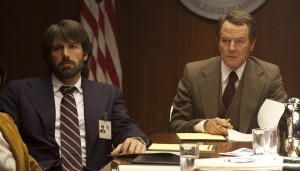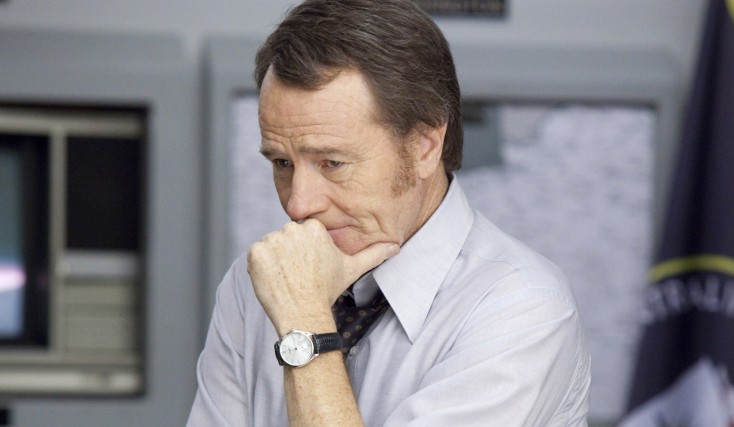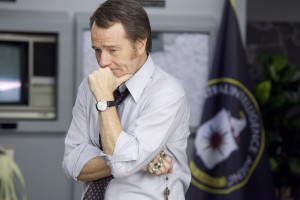By ANGELA DAWSON
Front Row Features
HOLLYWOOD—Bryan Cranston has mixed emotions about the upcoming fifth and final season of the critically acclaimed AMC series “Breaking Bad.” Though he will miss his colleagues and playing the drug-dealing schoolteacher Walter White, a role that has earned him three Emmys, he is eager and excited about the next chapter of his career. After two back-to-back hit series—he previously played goofball dad Hal on Fox’s “Malcolm in the Middle”—Cranston is looking beyond the small screen to exercise his craft.
In a departure from his TV characters, Cranston stars with Ben Affleck (who also directs) in “Argo,” the true story of the 1979 rescue of six Americans that escaped the takeover of the U.S. embassy in Iran, and hid for more than two months at the home of the Canadian ambassador.
Cranston plays CIA assistant deputy director Jack O’Donnell, a composite of several real spy agency officials, who backs a risky plan to extricate the embassy workers from the volatile country by sending in “exfiltration” specialist Tony Mendez (played by Affleck), posing as a Hollywood producer scouting locations for a science-fiction movie in Tehran, and then having embassy workers pretend to be part of the film crew as they fled Iran.
While many in Washington were skeptical about the seeming hair-brained scheme, Cranston’s O’Donnell supported it and helped facilitate its successful execution.
The 56-year-old Los Angeles native took time to talk about the chance-taking government official he plays, working inside the CIA offices and what’s ahead after “Breaking Bad” wraps.
Q: You went to the CIA’s headquarters in Langley, Va. Did you actually shoot there?
Cranston: We did. They read the script and realized we were not just another Hollywood company coming in to skewer and badmouth the CIA. They read it and went: this is from one of our own. And we asked them, for the sake of authenticity, could we shoot here? They were like, we’ll have to get back to you on that. And then they said yes. This was the first (movie production to work inside the CIA) since 9/11. They allowed us because of the confidence they had in Ben. They were convinced he would treat it with dignity and respect. So they allowed me to come in a couple of months before we started shooting and I was able to interview several CIA officers and just to try to get some background, and try and understand who I was about to become.
Q: Your character is a composite of a couple of different people. Was there one person that stood out to you?
Cranston: I wasn’t looking for anyone in particular to model after. I just wanted to get as much foundation as possible before I started to actually work on film so that I believed it. I felt, as I always feel, if I work enough and long enough to get to the point that I buy it and believe it, and then I’m ready to present it. At first, they were sort of monosyllabic. (I’d ask them) was it difficult to leave home? Yes. When you came home, your relationship with your wife and children, how did that work? Difficult. I slowly tried to start to make them realize that I’m not trying to get them to say something they don’t want to say, but just to open up in general. I just wanted to get a sensibility of the type of person I was about to play.
Q: Did you find some common ground?
Cranston: Yes. They’re not dissimilar from actors. Like actors, they often marry and date within their ranks. I met my wife (Robin Dearden) 25 years ago; she’s an actor. Since then, she’s been kissing men and I’ve been kissing women, and doing sex scenes and love scenes, and it’s like “oh, OK have fun. How was your day? I was making out with Julia Roberts. How was yours? Oh great.” You’re not threatened by it. You get it. It’s not strange, really, because you do it yourself. So that was interesting.
Q: Do you think this movie may reinforce some people’s view that Hollywood is tied in with the CIA?
Cranston: It’s a poignant question because of the times we’re living in now. If the movie resonates in modern culture, modern audiences, it’s because this condition (of strained relations with Iran) still exists. As things change, they also stay the same. The climate between Iran and the United States seems to never change. It’s going to take a great deal of diplomacy, respect, conversation, patience and interest on both sides. They’re going to have to be interested in bringing about change instead of isolationism and punishment. That’s not to apologize or make a political statement on one side or the other. It’s just that it takes a lot of effort.

(L-r) BEN AFFLECK as Tony Mendez and BRYAN CRANSTON as Jack OâDonnell in “Argo.” ©Warner Bros. Entertainment.
Q: “Argo” is coming out on the heels of this controversy over a movie called “The Innocence of Muslim” which has stoked anti-American sentiment in the Middle East, culminating with the storming of the embassy and the murder of the American ambassador in Libya.
Cranston: That’s a horrible coincidence. This story was picked up to produce as a movie in 1997. It was purchased then and took a few years to start developing. It takes time to find the right writer and get the right idea. It takes years and years and years. The fact that it’s being released now is purely coincidental. “Argo” is a credible story and an incredible one all in one.
Q: The fact that “Argo” is coming out during the Presidential election is interesting. Some people may think the timing of the release is politically motivated.
Cranston: I can say with absolute surety there was no political discussion. First and foremost, this is a piece of entertainment and all the producers know that and that’s their goal, which is to make a compelling piece of entertainment. The fact that it is based on a true story gives it credence and a sense of foundation that highlights the story itself and makes it all the more important and incredible when you’re experiencing it. There is no political agenda behind this. There will be skeptics who will disbelieve it. It’s also not the intent of the filmmaker to disprove that. It is what it is. And you can believe what you want to believe.
Q: You’ve got your last season of “Breaking Bad” coming up. Have you wrapped?
Cranston: We go back to work in December and start shooting the last eight (episodes). I don’t know anything about where it’s going to go. I don’t ask. They don’t tell me. I don’t want to know. I find out a week before we start shooting where (the plot) goes. While I’m shooting one episode, I’m unaware of the following episode. So it twists and turns with me. I find it to be more advantageous and rewarding as an actor that way.
Q: Have you thought about what’s next? Would you want to do another TV series right away?
Cranston: Right now, no. The idea would be, the loose plan, and I haven’t made this specifically known to my agency, is to stay away from series television for at least two or three years. Quite frankly, I need to step away from that. I had a year break between “Malcolm in the Middle” and the start of “Breaking Bad,” so for 13 years I’ve been doing that and I need and want to do more things. I want to do more theater. I plan to do a play next year in Los Angeles. I also hope to get off the ground a script that I wrote for a feature film that I’m going to direct. So I’m excited about that. So there are a lot of possibilities and I’m looking forward to seeing what’s next.
Q: Is there one thing you’ll miss most about “Breaking Bad.” Obviously, the people you work with.
Cranston: Oh, I can’t say that? It’s not only the family onscreen, but also the family behind the scenes that you miss. You spend 13-14 hours a day with these people for months on end, and they become a true family to you. That’s what I’ll miss the most. I’ll also miss the character of Walter White, who is, without a doubt, the most important and most fantastic role of my life. I’ll never have a role as good as Walter White. I know that and I’m OK with it.
Q: When the heck is “Malcolm in the Middle” going to be out on DVD?
Cranston: It’s a legal issue. I’m told the music rights weren’t negotiated for an extended period. It was right on the cusp of DVDs of television shows coming out and they didn’t include that for some reason. So the only thing available (on DVD) is the first season. There are a total of 151 episodes that still are not exposed. (The unavailability) helps for ratings in syndication but it would be nice if following generations would be able to see it (on DVD).
Q: What can you say about the film you want to direct?
Cranston: It’s a murder mystery I adapted from a novel and I’m very excited about it. An important component to it is a familial drama. So it’s this family—a father, a mother and a 16-year-old son—who are going through growing pains and trying to establish what the next level is for them.






